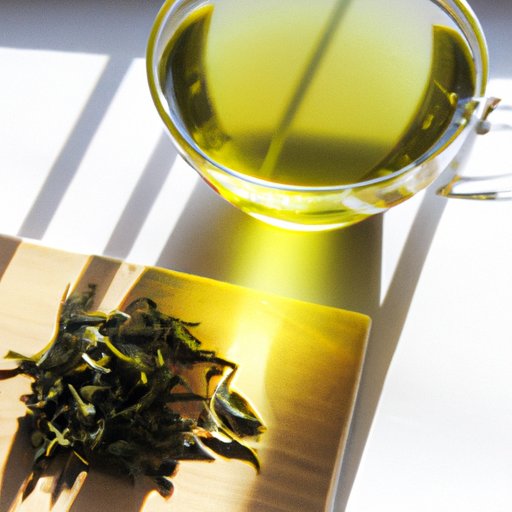Introduction
Green tea has become increasingly popular in recent years due to its numerous health benefits. It’s rich in antioxidants, can help boost metabolism, and may even help reduce the risk of certain diseases. But knowing when to drink green tea is just as important as understanding its many benefits. This article will explore when is the best time to drink green tea and how to maximize its potential health benefits.
Analyzing the Health Benefits of Green Tea at Different Times of Day
Green tea contains caffeine, a stimulant that can affect your energy levels and sleep patterns. Caffeine sensitivity varies from person to person, so it’s important to pay attention to how your body responds to green tea. Knowing the caffeine content of different types of green tea can help you determine when it’s best to drink it.
In addition to caffeine levels, it’s also important to consider the effects of drinking green tea before and after meals. Drinking green tea on an empty stomach can cause stomach acidity, while drinking it after a meal can interfere with the absorption of some nutrients. Timing is key when it comes to getting the most out of green tea.

Exploring How Caffeine Levels in Green Tea Affect its Consumption Time
The caffeine content of green tea varies depending on the type, but it generally ranges from 30 to 50 milligrams per 8-ounce cup. If you’re sensitive to caffeine, it’s best to avoid drinking green tea late in the day as it can disrupt your sleep patterns and circadian rhythms. On the other hand, if you’re looking for a natural energy boost, drinking green tea in the morning or early afternoon can be beneficial.
Cold-brewed green tea has less caffeine than hot-brewed green tea, so if you’re looking for a more gentle energy boost, cold-brewed green tea is a good option. However, cold-brewed green tea also has fewer antioxidants, so if you’re looking to maximize the health benefits of green tea, hot-brewed is the way to go.

Examining the Effects of Drinking Green Tea Before and After Meals
Drinking green tea before meals can increase stomach acidity, which can lead to digestive discomfort. It’s best to wait at least an hour after eating before drinking green tea. Drinking green tea after meals can also interfere with the absorption of some nutrients, so it’s best to wait at least an hour after eating before drinking green tea.
Temperature and brewing time can also affect the quality of green tea. For the best flavor and highest antioxidant content, it’s best to use water that’s between 160 and 180 degrees Fahrenheit and steep the tea for 3 to 4 minutes. Over-brewing can make green tea bitter, so be sure to follow the recommended brewing instructions.
Finally, it’s important to consider potential interactions between green tea and other foods or medications. Green tea can interact with certain medications, so always check with your doctor before consuming green tea if you’re taking any medications.
Conclusion
Green tea has numerous health benefits, but knowing when to drink it is just as important as understanding its potential benefits. In general, it’s best to avoid drinking green tea late in the day as it can disrupt your sleep patterns and circadian rhythms. It’s also best to wait at least an hour before and after meals before drinking green tea. To maximize the health benefits of green tea, it’s important to use water that’s between 160 and 180 degrees Fahrenheit and steep the tea for 3 to 4 minutes.
By following these tips and paying attention to your body’s response to green tea, you can enjoy all of the potential health benefits of this delicious beverage.


